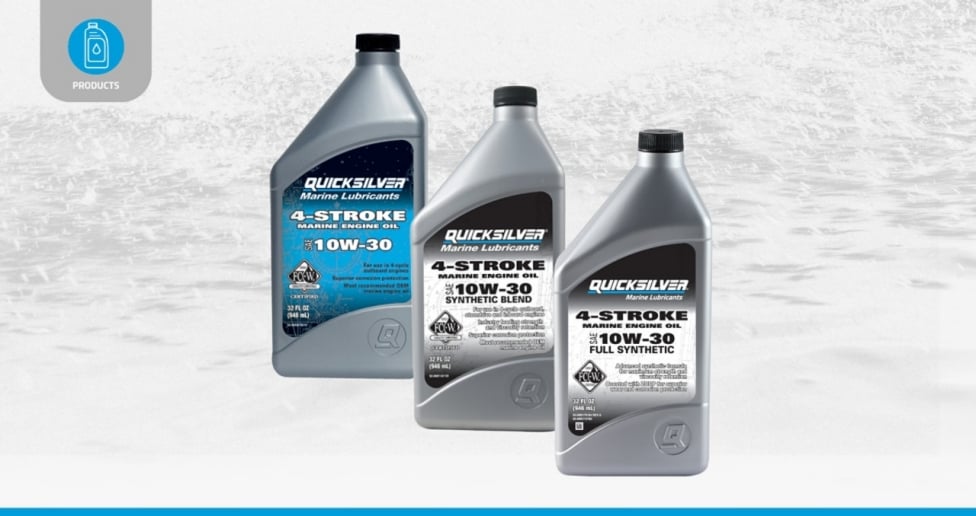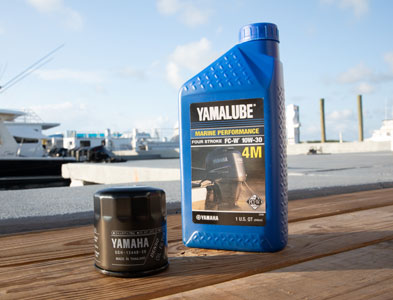The best oil for marine diesel engines is a high-quality marine diesel engine oil that meets the specific requirements and recommendations of the engine manufacturer. It is crucial to use the correct oil to ensure optimal engine performance, efficiency, and longevity.
Selecting the right oil for marine diesel engines is essential for their smooth operation and longevity. These engines operate under demanding conditions, including high temperatures, heavy loads, and prolonged periods of use. Using the proper oil that meets the manufacturer’s specifications is crucial to maintain performance and prevent damage.
In this blog post, we will explore the factors to consider when choosing the best oil for marine diesel engines, including viscosity, additive package, and compatibility with engine components. Additionally, we will discuss the importance of regular oil analysis and maintenance practices to ensure optimal engine performance and reliability. Let’s dive in!

Credit: www.quicksilver-products.com
Introduction To Marine Diesel Engines
Marine diesel engines are the workhorses of the maritime industry, powering a wide range of vessels from cargo ships to fishing boats. These engines are designed to provide reliable and efficient performance in the challenging marine environment, making them a critical component of any seafaring operation.
Importance Of Choosing The Right Oil
Choosing the right oil for marine diesel engines is crucial for ensuring optimal performance and longevity. The harsh operating conditions at sea, including high temperatures, heavy loads, and prolonged engine operation, place significant demands on the engine and its lubrication system. Using the best oil helps to protect the engine components, minimize wear and tear, and optimize fuel efficiency, ultimately contributing to the overall reliability and cost-effectiveness of the vessel.
Key Characteristics Of Marine Diesel Engines
Marine diesel engines are known for their robustness, high torque output, and fuel efficiency, making them the preferred choice for commercial and industrial marine applications. These engines are specifically designed to withstand the rigors of continuous operation at sea, with features such as heavy-duty construction, efficient cooling systems, and reliable fuel delivery mechanisms. The ability to generate high levels of torque at low engine speeds is a key advantage of marine diesel engines, allowing for efficient propulsion of large vessels and heavy loads.

Credit: rotella.shell.com
Types Of Oil Used In Marine Diesel Engines
When it comes to maintaining the performance and longevity of marine diesel engines, choosing the right type of oil is crucial. There are various types of oils used in marine diesel engines, each with its own unique properties and advantages. Understanding the differences between these types of oils can help marine engine owners make informed decisions about the best oil for their specific needs.
Mineral Oils
Mineral oils, derived from crude oil, are the traditional choice for marine diesel engines. They are cost-effective and offer good lubrication properties, making them suitable for moderate operating conditions. However, they have limitations in extreme temperature and high-performance applications.
Synthetic Oils
Synthetic oils, made from artificially produced chemical compounds, offer superior performance and protection compared to mineral oils. They provide enhanced lubrication, thermal stability, and resistance to oxidation, making them ideal for high-performance marine diesel engines operating in harsh conditions.
Bio-based Oils
Bio-based oils, derived from renewable sources such as plant or animal fats, are gaining popularity due to their eco-friendly nature. They offer good lubrication and biodegradability, making them a sustainable choice for environmentally conscious marine engine owners. However, their performance in extreme conditions may vary.
Factors Influencing Oil Selection
Choosing the best oil for marine diesel engines is crucial for ensuring optimal performance and longevity. Several key factors influence the selection of the most suitable oil for these engines, including engine type and design, operating conditions, and environmental considerations.
Engine Type And Design
The type and design of the marine diesel engine play a significant role in determining the most appropriate oil. Different engines have varying requirements based on factors such as cylinder configuration, fuel type, and operating temperatures. Manufacturers often provide specific recommendations for oil viscosity and performance ratings tailored to their engine designs.
Operating Conditions
The operating conditions under which a marine diesel engine functions are critical in oil selection. Factors such as load capacity, speed, and frequency of operation impact the oil’s ability to lubricate and protect the engine components effectively. Extreme operating conditions, such as frequent startups and high operating temperatures, may necessitate the use of specialized oils with enhanced thermal stability and wear protection.
Environmental Considerations
Environmental considerations also play a vital role in choosing the best oil for marine diesel engines. Eco-friendly and biodegradable oils may be preferred for vessels operating in environmentally sensitive areas to minimize the risk of oil spills and reduce ecological impact. Additionally, low emission oils can contribute to the overall environmental sustainability of marine operations.
Top Oils For Marine Diesel Engines In 2023
Marine diesel engines are an essential component of any marine vessel, and ensuring they are properly lubricated is crucial for their longevity and performance. With so many oil options available in the market, it can be challenging to choose the right one for your engine. In this article, we will review the top oils for marine diesel engines in 2023, including their pros and cons and price comparison.
Product Reviews
After thorough research and analysis, we have identified the following oils as the best options for marine diesel engines in 2023:
| Oil Brand | Viscosity | Price per Gallon |
|---|---|---|
| Shell Rotella T6 Full Synthetic | 15W-40 | $21.99 |
| Mobil Delvac 1 ESP Synthetic | 5W-40 | $24.99 |
| Valvoline Premium Blue Extreme | 15W-40 | $19.99 |
All of these oils offer excellent performance and protection for marine diesel engines, with the synthetic options providing superior protection against wear and tear. However, it is essential to choose an oil with the recommended viscosity range for your engine to ensure optimal performance.
Pros And Cons
Each of these oils has its own unique set of advantages and disadvantages, which we have outlined below:
Shell Rotella T6 Full Synthetic
- Pros: Excellent wear protection, improved fuel efficiency, and extended drain intervals.
- Cons: Slightly more expensive than conventional oils.
Mobil Delvac 1 ESP Synthetic
- Pros: Provides excellent wear protection, improved fuel efficiency, and extended drain intervals. Also, it is low ash and reduces emissions.
- Cons: Higher price point than conventional oils.
Valvoline Premium Blue Extreme
- Pros: Provides excellent wear protection, improved fuel efficiency, and extended drain intervals. Also, it is compatible with both diesel and biodiesel fuels.
- Cons: May not be suitable for engines with high soot levels.
Price Comparison
While all of these oils offer superior performance and protection for marine diesel engines, there is a price difference to consider. Here is a breakdown of their price per gallon:
- Shell Rotella T6 Full Synthetic: $21.99
- Mobil Delvac 1 ESP Synthetic: $24.99
- Valvoline Premium Blue Extreme: $19.99
While the synthetic oils are slightly more expensive, they offer better performance and extended drain intervals, making them a cost-effective choice in the long run.
Performance Analysis
When choosing the best oil for marine diesel engines, a crucial factor to consider is its performance. Let’s delve into how different oils affect the performance of your engine in terms of wear and tear reduction, fuel efficiency, and engine cleanliness.
Wear And Tear Reduction
High-quality marine engine oils help reduce wear and tear, prolonging the engine’s lifespan.
Fuel Efficiency
The right oil can improve fuel efficiency by ensuring optimal engine performance.
Engine Cleanliness
Premium oils maintain engine cleanliness, preventing buildup and enhancing overall efficiency.
Environmental Impact
When it comes to marine diesel engines, considering the environmental impact of the oil used is crucial. Selecting the best oil can lead to emission reduction, promote biodegradability, and ensure regulatory compliance.
Emission Reduction
By choosing the right oil, marine diesel engines can reduce harmful emissions, contributing to cleaner air and a healthier marine environment.
Biodegradability
The best oils for marine engines are highly biodegradable, minimizing their impact on marine ecosystems in case of spills or leaks.
Regulatory Compliance
Opting for oils that meet regulatory standards ensures that marine vessels operate in accordance with environmental laws and regulations.
Maintenance And Oil Change Tips
Discover the top-rated oil for marine diesel engines to ensure optimal performance and longevity. Proper maintenance and regular oil changes are crucial for preserving the efficiency of your marine engine. Choose a high-quality oil that meets the specific requirements of your vessel’s diesel engine.
Best Practices
To keep your marine diesel engine running smoothly, it is important to follow the best maintenance practices. Regular maintenance and oil changes can prevent costly repairs and prolong the life of your engine. Here are some best practices to follow:
- Inspect the oil filter and replace it regularly.
- Check the oil level and top it off as needed.
- Use the recommended oil viscosity and type for your engine.
- Keep the engine clean and free of debris.
- Monitor the engine’s performance and address any issues promptly.
Frequency Of Oil Changes
The frequency of oil changes for marine diesel engines can vary depending on several factors such as engine hours, operating conditions, and type of oil used. As a general rule, it is recommended to change the oil every 100-150 hours of operation or once a year, whichever comes first. However, if you operate your boat in harsh conditions such as saltwater or extreme temperatures, you may need to change the oil more frequently. Always refer to the manufacturer’s guidelines for your specific engine.
Diy Vs Professional Services
While it is possible to perform oil changes on your marine diesel engine yourself, it may be best to leave it to the professionals. Professional services have the expertise and equipment to perform a thorough oil change and maintenance check. Additionally, they can identify any potential issues before they become major problems. However, if you have experience with marine engines and the necessary tools, you can perform the oil change yourself. Just make sure to follow the manufacturer’s guidelines and use high-quality oil and filters. In conclusion, proper maintenance and oil changes are crucial for the longevity and performance of your marine diesel engine. By following the best practices, knowing the frequency of oil changes, and deciding whether to perform the oil change yourself or hire a professional, you can keep your engine running smoothly and avoid costly repairs.
Future Trends In Marine Engine Oils
Discover the top marine diesel engine oils shaping the future trends in marine lubrication. Optimal performance, efficiency, and longevity are key considerations for selecting the best oil for marine diesel engines. Stay ahead with advanced formulations tailored for marine applications.
The marine industry is constantly evolving, and so are the oils used in marine diesel engines. As environmental concerns and regulations become more stringent, manufacturers are developing newer and better oils that meet these requirements. In this article, we will take a closer look at the future trends in marine engine oils, including advancements in oil technology, a shift towards sustainability, and emerging market players.
Advancements In Oil Technology
Advancements in oil technology are paving the way for better performance and longer engine life. Manufacturers are developing oils that can withstand high temperatures and pressures, reduce engine wear and tear, and improve fuel efficiency. Some of the latest advancements in oil technology include:
- Low-ash oils that reduce engine deposits and emissions
- Synthetic oils that provide better protection against wear and tear
- Multi-grade oils that perform well in both cold and hot temperatures
Shift Towards Sustainability
With increasing environmental concerns, there is a growing shift towards sustainable oils that are biodegradable and eco-friendly. These oils are designed to minimize the impact on the environment while providing the same level of performance. Some of the sustainable oils being developed include:
- Vegetable-based oils that are biodegradable and non-toxic
- Bio-synthetic oils that are made from renewable resources
- Low-emission oils that reduce greenhouse gas emissions
Emerging Market Players
As the demand for better and more sustainable oils grows, there are emerging market players entering the industry. These companies are developing innovative oils that are designed to meet the changing needs of the marine industry. Some of the emerging market players include:
| Company | Oil Type |
|---|---|
| ExxonMobil | Mobilgard™ M420 |
| Chevron | Delo 710 |
| Castrol | CRB Turbo 228 |
In conclusion, the future of marine engine oils is exciting, with advancements in technology, a shift towards sustainability, and emerging market players. As the industry continues to evolve, we can expect to see even more innovative oils that provide better performance, increased engine life, and a reduced impact on the environment.

Credit: yamahaoutboards.com
Frequently Asked Questions
Faq 1: What Is The Best Oil For Marine Diesel Engines?
The best oil for marine diesel engines is a high-quality marine-specific oil that meets the manufacturer’s specifications. It should have excellent lubricating properties, resist breakdown under high temperatures, and provide optimal protection against corrosion and wear. Regular oil analysis and following the recommended oil change intervals are also essential for maintaining engine performance and longevity.
Faq 2: Can I Use Automotive Oil In A Marine Diesel Engine?
Using automotive oil in a marine diesel engine is not recommended. Automotive oils are formulated differently and may not provide the necessary protection against the harsh marine environment, higher operating temperatures, and increased soot and carbon buildup. It is crucial to use marine-specific oils that are specifically designed to meet the unique requirements of marine diesel engines.
Faq 3: How Often Should I Change The Oil In My Marine Diesel Engine?
The frequency of oil changes in marine diesel engines depends on various factors, including engine hours, operating conditions, and the type of oil used. Generally, it is recommended to change the oil every 100 to 200 engine hours or at least once a year, even if the engine hasn’t been used extensively.
Regular oil analysis can help determine the appropriate oil change intervals for your specific engine and operating conditions.
Faq 4: Are Synthetic Oils Better For Marine Diesel Engines?
Synthetic oils can offer several advantages for marine diesel engines. They have superior heat resistance, better viscosity stability, and improved lubricating properties, which can result in reduced wear, improved fuel efficiency, and extended engine life. However, it is essential to consult the engine manufacturer’s recommendations and ensure that the synthetic oil meets the necessary specifications for your marine diesel engine.
Conclusion
Choosing the right oil for your marine diesel engine is crucial. By selecting a high-quality, marine-specific oil, you can ensure optimal engine performance and longevity. Regular maintenance and using the manufacturer’s recommended oil will help keep your marine engine running smoothly for years to come.
Read More: Best Engine Oil for Mercedes C220 Diesel

